
INFORMATION RESEARCH-AN INTERNATIONAL ELECTRONIC JOURNAL
Scope & Guideline
Illuminating Pathways in Library and Information Sciences.
Introduction
Aims and Scopes
- Healthcare Informatics and Data Management:
Research focusing on the management and utilization of health data, including electronic health records (EHR), personal health records, and data interoperability to enhance healthcare delivery. - Artificial Intelligence and Machine Learning Applications:
Exploration of AI and machine learning methodologies for predictive analytics, diagnostic support, and improving clinical decision-making processes within healthcare. - Digital Health Innovations:
Studies on the development and implementation of digital health technologies, including mobile health applications, telemedicine, and remote patient monitoring systems. - Ethical and Societal Implications of Health Technology:
Examination of ethical considerations, public attitudes, and societal impacts related to the adoption of health technologies and data privacy. - Education and Training in Health Informatics:
Focus on the training and competencies required for healthcare professionals in the use of information technologies and informatics education.
Trending and Emerging
- Integration of Artificial Intelligence in Healthcare:
A significant increase in research focusing on AI applications in healthcare, particularly in predictive analytics, diagnostic support, and personalized medicine, indicating a trend toward harnessing AI for improved patient outcomes. - Digital Health and Mobile Health Applications:
Growing interest in the development and evaluation of mobile health applications and digital health platforms, emphasizing their role in chronic disease management and patient engagement. - Big Data and Health Analytics:
A rising focus on the use of big data analytics in healthcare settings, exploring how large datasets can inform clinical decisions and public health strategies. - Interoperability and Data Standards:
Emerging discussions on the importance of interoperability among health information systems and the adoption of standardized data models to facilitate seamless data exchange. - Ethics and Governance in Health Informatics:
Increasing emphasis on the ethical implications of AI and data use in healthcare, including concerns around privacy, consent, and equitable access to digital health technologies.
Declining or Waning
- Traditional Health Information Systems:
Research centered on older models of health information systems and their functionalities is declining as new, more integrated digital health solutions emerge. - Basic Telehealth Studies:
While telehealth remains important, the focus on basic descriptive studies of telehealth practices is decreasing, giving way to more advanced studies that evaluate the effectiveness and integration of telehealth with AI and data analytics. - General Patient Survey Studies:
There is a reduction in the publication of general survey studies that gather patient opinions without deeper analytical frameworks, as more complex methodologies gain preference.
Similar Journals

Intelligent Medicine
Advancing medical practice with cutting-edge AI research.Intelligent Medicine, published by Elsevier, is a leading open-access journal dedicated to advancing the fields of Artificial Intelligence, Biomedical Engineering, Health Informatics, and related areas within Medicine. Since its inception in 2021, it has quickly established itself among the top tier of academic publications, holding a commendable Q2 ranking in several categories, including a rank of #51 in Health Informatics and #104 in Medicine (Miscellaneous) as of 2023. The journal aims to disseminate innovative research that harnesses AI technologies to improve healthcare outcomes, bridging the gap between cutting-edge technology and medical practice. With its open-access model, Intelligent Medicine ensures broad dissemination of research findings, facilitating collaboration and knowledge sharing among researchers, practitioners, and students globally. Located in Amsterdam, Netherlands, this journal plays a pivotal role in shaping the future of intelligent healthcare solutions, inviting submissions that push the boundaries of conventional medicine through creative and impactful research.
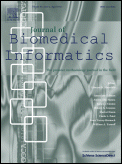
JOURNAL OF BIOMEDICAL INFORMATICS
Bridging technology and health for a better tomorrow.JOURNAL OF BIOMEDICAL INFORMATICS, published by Academic Press Inc. Elsevier Science, is a premier peer-reviewed journal dedicated to the integration of computer science and health informatics to advance the field of biomedical engineering and healthcare. With its ISSN 1532-0464 and E-ISSN 1532-0480, this influential journal has established itself with an impressive impact factor, reflecting its high-quality research contributions. Recognized within the top quartile (Q1) of both Computer Science Applications and Health Informatics for 2023, the journal ranks #135 out of 817 in Computer Science Applications and #25 out of 138 in Health Informatics according to Scopus metrics. Offering open access options, it fosters extensive dissemination and accessibility of groundbreaking research findings to the scientific community. As a scholarly platform from 2001 to 2024, it is engineered to cater to the educational needs of researchers, professionals, and students, promoting innovative studies that bridge the gap between technology and healthcare.
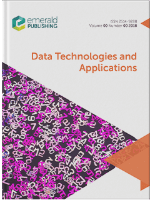
Data Technologies and Applications
Advancing Knowledge in Data TechnologiesData Technologies and Applications is a leading academic journal published by Emerald Group Publishing Ltd, captivating the interest of researchers, professionals, and students alike within the dynamic fields of Information Systems and Library and Information Sciences. With its ISSN 2514-9288 and E-ISSN 2514-9318, this journal holds a commendable Q2 ranking in Library and Information Sciences and a Q3 ranking in Information Systems as of 2023, reflecting its impact and contribution to ongoing discourse in these disciplines. Operating with an open access model, it provides a platform for accessing high-quality research that encompasses innovative methodologies and applications of data technologies. The journal's scope includes interdisciplinary studies that leverage data to enhance decision-making, improve information retrieval, and foster technological convergence. Housed in the United Kingdom, the journal facilitated its first publication in 2018, with a commitment to fostering valuable academic conversations through to 2024 and beyond. Engage with insightful research that shapes the future of data technologies and applications, making this journal an essential resource for anyone invested in the advancement of knowledge in these pivotal fields.
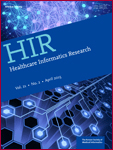
Healthcare Informatics Research
Driving excellence in healthcare informatics since 2010.Healthcare Informatics Research, published by the Korean Society of Medical Informatics, is a leading open access journal that has been advancing the field of healthcare informatics since its inception in 2010. With an ISSN of 2093-3681 and E-ISSN of 2093-369X, the journal provides a vital platform for disseminating high-quality research aimed at improving healthcare systems through innovative informatics solutions. Recognized for its contributions, it holds a Q2 rank in Biomedical Engineering and Q3 rankings in both Health Informatics and Health Information Management for 2023, reflecting its stature within the academic community. The journal is committed to open access, ensuring that research is freely accessible to researchers, professionals, and students worldwide, thus promoting knowledge sharing and collaboration. Located in the dynamic city of Seoul, South Korea, the journal serves as a hub for groundbreaking studies that impact health systems globally, making it an essential resource for those at the forefront of healthcare technology and management.
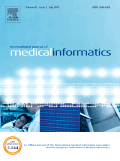
INTERNATIONAL JOURNAL OF MEDICAL INFORMATICS
Empowering Healthcare with Cutting-edge TechnologyInternational Journal of Medical Informatics, published by Elsevier Ireland Ltd, is a premier peer-reviewed journal dedicated to advancing the field of health informatics. Established in 1997, this journal has consistently strived to disseminate high-quality research and innovative practices, now recognized in the Q1 quartile of health informatics for 2023, ranking impressively at #24 out of 138 in Scopus. The journal's focus encompasses the integration of computer science and information technology in healthcare, fostering discussions on data management, telemedicine, health information systems, and decision support mechanisms. With an ISSN of 1386-5056 and E-ISSN of 1872-8243, it provides options for both subscription and open access, ensuring broad dissemination of research findings. As a vital resource for researchers, professionals, and students in the rapidly evolving domain of medical informatics, the International Journal of Medical Informatics is positioned to be at the forefront of knowledge translation in the health sector, contributing significantly to improvements in patient care and healthcare delivery.
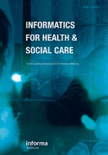
Informatics for Health & Social Care
Transforming health through innovative informatics.Informatics for Health & Social Care is a leading journal published by Taylor & Francis Inc, dedicated to the intersection of health informatics and social care. With a strong emphasis on advancing knowledge in the fields of health information management and nursing, this journal has established itself as a vital resource for researchers and professionals seeking to explore innovative applications of informatics to improve patient outcomes and streamline healthcare delivery. Recognized for its influential contributions, it currently holds a Q2 ranking in both Health Informatics and Health Information Management, as well as a prestigious Q1 ranking in Nursing (miscellaneous) for 2023, signifying its critical role within the academic community. The journal is accessible for open access viewing, fostering a broader dissemination of research findings. Released continuously since 1976, it stands as a testament to the evolving landscape of health informatics, addressing pertinent issues and facilitating discussions that shape practices in health and social care delivery.
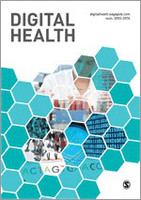
Digital Health
Unlocking the Future of Health with Digital Insights.Digital Health is a pioneering open-access journal published by SAGE Publications Ltd, dedicated to advancing the field of health technology and its intersection with health policy, informatics, and the broader medical landscape. Since its inception in 2015, the journal has rapidly established itself as an essential resource for researchers, professionals, and students, serving as a platform for innovative research that leverages digital tools to improve health outcomes. Currently ranked in the Q2 category across four relevant domains, including Computer Science Applications and Health Informatics, it commands respect within the academic community. With its accessible framework, Digital Health facilitates the dissemination of critical findings and new methodologies that inform policy and practice. The journal’s commitment to open access promotes worldwide access and cooperation, making significant contributions to the evolving landscape of digital health.
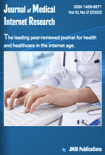
JOURNAL OF MEDICAL INTERNET RESEARCH
Connecting Healthcare and Technology for a Healthier TomorrowJOURNAL OF MEDICAL INTERNET RESEARCH, published by JMIR PUBLICATIONS, INC, stands as a pivotal resource in the field of Health Informatics, with an esteemed ranking of #7 out of 138 in the Scopus database, placing it in the top 95th percentile. Since its inception in 1999, this Open Access journal has been committed to disseminating high-quality, peer-reviewed research that explores the intersection of healthcare and internet technologies. With its headquarters in Toronto, Canada, the journal encompasses a broad range of topics, including eHealth, telemedicine, and mobile health innovations. The impact factor and its Q1 quartile ranking highlight the journal's significant influence and prevalence in advancing the understanding of digital health landscapes. Researchers, professionals, and students alike benefit from its valuable insights, making the JOURNAL OF MEDICAL INTERNET RESEARCH an essential tool for fostering informed practices and policy-making in the rapidly evolving domain of health informatics.
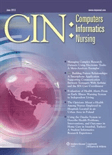
CIN-COMPUTERS INFORMATICS NURSING
Exploring New Frontiers in Nursing InformaticsCIN-COMPUTERS INFORMATICS NURSING is a distinguished journal that publishes cutting-edge research at the intersection of nursing and information technology. Published by Lippincott Williams & Wilkins, the journal has been a pivotal platform since 2002, catering to the needs of health informatics professionals and nursing researchers. With an impressive impact factor and ranked within Q2 in Nursing (miscellaneous) and other relevant categories, it serves as a key resource for advancing knowledge and best practices in the field. The journal's inclusion in important databases ensures broad visibility and access to the latest findings that influence healthcare delivery. CIN-COMPUTERS INFORMATICS NURSING welcomes a diverse range of articles, including empirical studies, reviews, and innovative methodology approaches, making it an invaluable asset for clinicians, educators, and scholars dedicated to enhancing nursing informatics and improving patient outcomes.
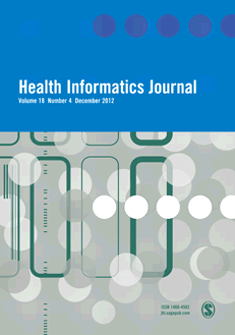
Health Informatics Journal
Empowering professionals with accessible health research.Health Informatics Journal, published by SAGE Publications Inc., serves as a premier platform for research and discussion in the dynamic field of health informatics since its inception in 1995. With an impressive Q2 ranking in the Health Informatics category and a notable 77th percentile ranking in the Scopus database, this journal provides an essential resource for academics and professionals alike. The journal's transition to Open Access since 2020 has further broadened its reach, ensuring that innovative research is accessible to a global audience. Covering a wide range of topics within health informatics, the journal aims to foster high-quality scholarly communication and facilitate the dissemination of cutting-edge insights that can help advance health care delivery and patient outcomes. With an ongoing commitment to excellence, the Health Informatics Journal is dedicated to enhancing the intersection of technology and healthcare through rigorous research and collaborative exploration.